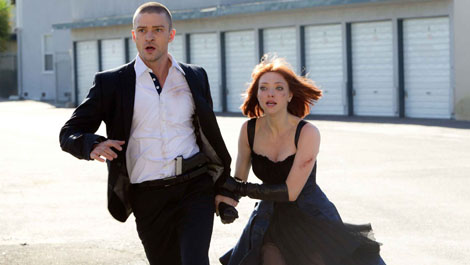Why you can trust 12DOVE
There’s a great idea at the centre of Andrew Niccol’s ( Gattaca ) latest that wouldn’t be out of place in a Philip K Dick story.
In the future, human life is metered past the age of 25, time – displayed on the wrist – has replaced money as currency, and the rich spend eternity in luxurious indolence while the poor beg, borrow or steal for a few miserable minutes more.
Playing his first action lead, Justin Timberlake plays a lowly clock-puncher who’s gifted a huge time windfall by a suicidal stranger. But it’s not long before he’s being chased by Cillian Murphy’s cop-like Time Keeper and dallying with Amanda Seyfried’s cosseted rich girl.
It’s a promising set-up: because people don’t visibly age after 25, the 30-year-old Timberlake’s mum is the 27-year-old Wilde; we see adverts for 99-secs stores; while people ‘time out’ (ie die) in the streets, their life spans leeching away on their wrists like faded tattoos.
Trouble is, there’s a disconnect between concept and execution, with Niccol’s early invention petering out in favour of clodhopping chase-movie dynamics. When a waitress tells JT he doesn’t belong in her time-rich world because he does everything too fast (“Not everything…” he leers), she’s got a point.
Why aren’t the poor racing /all/ the time? Why is the world of the movie /exactly/ the same as ours, except for the entire process of human interaction (and a few nifty cars)? Why did anyone agree to a system which makes cooking eggs a cinch, but oversleeping potentially fatal? Why hasn’t Niccol answered any of these questions?
The performances are just as insubstantial. Timberlake doesn’t embarrass himself, but he’s not exactly a rugged, wrong-side-of-the-tracks action hero, while Seyfried and co drift between underwritten and insipid.
It’s not really their fault; having pretty young things playing beyond their years strips away the gravitas from the characters’ plights. How can they know what they stand to lose if they look like they’ve never lived?
A grown-up sci-fi idea suffering from a severe case of arrested (script) development, In Time plays like Equilibrium without the fights, or Total Recall without the fun.
Matt Glasby is a freelance film and TV journalist. You can find his work on Total Film - in print and online - as well as at publications like the Radio Times, Channel 4, DVD REview, Flicks, GQ, Hotdog, Little White Lies, and SFX, among others. He is also the author of several novels, including The Book of Horror: The Anatomy of Fear in Film and Britpop Cinema: From Trainspotting To This Is England.

Beloved Bethesda actor from Skyim, Fallout 3, and more shares heartfelt thanks after waking up from a coma and discovering hundreds of people have donated to his medical bills

Stranger Things season 5 releasing in 2025 might not be a certainty as its creators admit that target is "quite the push"

James Gunn weighs in on a potential deep-cut Avengers: Endgame and Guardians of the Galaxy plot hole
